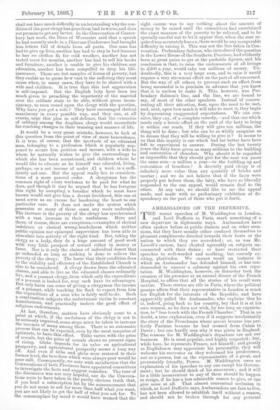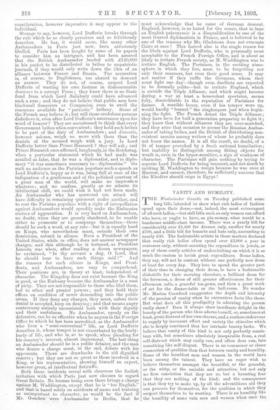AMBASSADORS ON THE DEFENSIVE.
THE recent speeches of M. Waddington in London, and Lord Dufferin in Paris, mark something of a new departure in diplomatic ways. Ambassadors have often spoken before at public dinners and on other occa- sions, but they have usually either confined themselves to pleasant compliments directed towards their hosts or the, nation to which they are accredited ; or, as was Mr. Lowell's custom, have chatted agreeably on subjects un- connected with their duties ; or have restricted their speeches to well-worded and soothing, but scarcely ex- citing, platitudes. We cannot recall an instance in which an Ambassador has defended himself, or has con- descended to answer a calumny against his own repu- tation. M. Waddington, however, on Saturday took the occasion of his presence at an annual dinner of the French Hospital, to affirm that all the stories of his recall were untrue. These stories are rife in Paris, where the political gossips affirm that their representative in London is much too English for the interests of the Republic, and have apparently galled the Ambassador, who explains that he is, indeed, going back to his country, but that it is at his own request, as he does not wish, by too long an expatria- tion, to " lose touch with the French Chamber." That is, no doubt, a true explanation, even if it suggests involuntarily the story of the Frenchman whose accent became less per- fectly Parisian because he had crossed from Calais to Dover ; but one hardly sees why it was given in England. The reasons for M. Waddington's departure are not our business. He is most popular, and highly respected; but, while here, he represents France, not himself; and greatly as Englishmen may appreciate his personality, they will welcome his successor as they welcomed his predecessor, not as a person, but as the representative of a great, and presumably friendly, Power. M. Waddington. owes no explanation of his speeches to any one except his Govern- ment ; but he should think of his successors ; and it will be a little inconvenient to any of them should he happen to resign, if he has a less admirable reason esi osgeiVlue,oerucainn give none at all. That almost conventual which, as Lord Dufferin says, Ambassadors are fain to live, has not been allowed to establish itself without a reason, and should not be broken through for any personal consideration, however imperative it may appear to the Strange to say, however, Lord Dufferin breaks through the rule which he so clearly perceives and. so felicitously describes. He has, it would seem, like many other Ambassadors in Paris just now, been atrociously libelled. Paris has been taught by some of its papers to consider him an intriguer, and has been assured that the British Ambassador landed. with £120,000 in his pocket to be distributed in bribes to unpatriotic journals, if they would only write down the idea of an alliance ' between France and Russia. The accusation is, of course, to Englishmen, too absurd to demand an answer. They do not, of course, suspect Lord Dufferin of wasting his own fortune in dishonourable ciauceurs to a corrupt Press they know there is no State fund from which Lord. Salisbury could have advanced such a sum ; and they do not believe that public men here blackmail financiers or Companies, even to swell the resources available for "patriotic" bribery. Some of the French may believe it ; but will those credulous persons disbelieve it, even after Lord. Dufferin's assurances upon his word of honour ? They are accustomed. to think that every Government bribes when convenient ; they hold such bribes to be part of the duty of Ambassadors; • and. cl4mentis, however solemn, weigh no more with them than the denials of the accused weigh with a jury. Is Lord Dufferin better than Prince Bismarck ? they will ask ; and Prince Bismarck once affirmed, lau ghingly, in the Reichstag, when a particular statement which he had made was assailed as false, that he was a diplomatist, and in diplo- macy "it was sometimes necessary to—diplomatise." On such an audience as the Parisian populace such a speech as Lord Dufferin's, happy as it was, being full at once of the indignation of a gentleman and of the polished courtesy of a great man of the world, will make no impression whatever ; and we confess, greatly as we admire its intellectual skill, we could wish it had not been made. An Ambassador who has answered one attack will have difficulty in remaining quiescent under another, and to vest the Parisian populace with a right of interpellation against Ambassadors would speedily make the Embassies centres of aggravation. It is very hard on Ambassadors, no doubt, when they are grossly slandered, to be unable either to prosecute or to compurge themselves—there should be such a word, at any rate—but it is equally hard on Kings, who nevertheless must, outside their own dominions, submit in silence. Even a, President of the United States, while in office, does not answer newspaper charges, and this although he is tortured, as President Lincoln was when, after reading a dozen newspapers, he exclaimed, "Is thy servant a dog, 0 Lord, that he should bear to have such things said ?" And the reasons for such silence in Kings, and Presi- dents, and Ambassadors, are easy to comprehend. Their positions are, in theory at least, independent of character. The Kingship does not exist because the King is good, or the Embassy because the Ambassador is a man of piety. They are not responsible to those who libel them, but to other and greater powers ; and. they hold their offices on condition of never descending into the public arena. If they deny any charges, they must, unless their denial is accepted, keep on denying ; and. that means angry controversy entirely inconsistent both with their dignity and their usefulness. No Ambassador, openly on the defensive, can be as effectiire when he argues in the Foreign Office to which he has been accredited, as the Ambassador who lives a " semi-conventual " life, as Lord. Dufferin describes it, whose temper is not exacerbated. by the hurly- burly of life, and who is, so to speak, when pleading for his country's interest, almost impersonal. The last thing an Ambassador should be is a public debater, and the man who denies a charge must, in the end, debate with his opponents. There are drawbacks in the old dignified. reserve ; but they are not so great as those involved in a King, or his representative, showing himself an expert, however great, at intellectual fisticuffs. Both these incidents reveal with clearness the foolish irritation with which Paris just now chooses to regard Great Britain. No human being even there brings a charge against M. Waddington, except that he is "too English," and that is based solely on accidents of name and training as unimportant to character, as would be the fact if Mr. Goschert were Ambassador in Berlin, that he must acknowledge that he came of German descent. England, however, is so hated for the nonce, that to bear an English patronymic is a disqualification to one of the most trusted diplomatists in France, and. is believed to be one of the reasons why Mr. Gladstone does not evacuate Cairo at once ! This hatred also is the single reason for the libels against Lord Dufferin, who is personally most acceptable to the French Foreign Office, and is about as likely to irritate French society, as M. Waddington was to irritate English. The Parisians, in the exciting atmo- sphere in which they live, seem to be forgetting not only their manners, but even their good sense. It may not matter if they ruffle the Germans, whom they must fight one day—though even, duellists are expected to be formally polite—but to irritate England, which is outside the Triple Alliance, and which might become during a war at least a benevolent spectator, seems folly, discreditable to the reputation of Parisians for finesse. A sensible boxer, even if his temper were up, would hardly " bonnet " the ringkeepers just when begin- ning the fight. The French detest the Triple Alliance ; they have been for half a generation preparing to fight it ; they know that without alliances they are over-matched, and they seize that occasion to accuse the Russian Ambas- sador of taking bribes, and the British of distributing non- existent monies among writers of whom he probably does not know the names. It is all the result, no doubt, of a fit of temper provoked by a fresh national humiliation; but inability to distinguish among fitting objects for wrath is, even in the hyper-sensitive, a, sign of weakness of character. The Parisians will gain nothing by trying to asperse Lord Dulferin for being innocent and not much by inviting M. Waddington to resign because he was once at Harrow, and cannot, :therefore, be sufficiently anxious that the Khedive should reign in Egypt 1



































 Previous page
Previous page